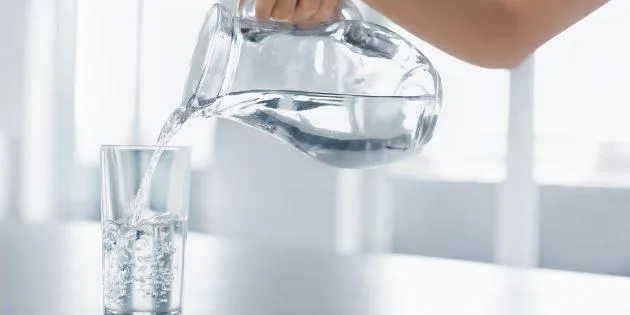
Water: Elixir of Health and Vitality
Water: Elixir of Health and Vitality
Water. We can’t live without it. Literally. It comprises about 70% of adult body weight and even more for infants and children. Essential to every cell in the body, water helps to:
maintain normal temperature through sweating and respiration
regulate thirst and appetite
transport nutrients in the bloodstream
remove waste and toxins through urination, perspiration, and bowel movements
reduce friction in joints and facilitate muscle contraction
balance pH level (acid and alkaline)
nourish the skin
How do I know if I’m drinking enough water?
Everyone’s hydration needs are different, depending upon age, gender, activity level, body composition, and overall health. It’s more myth than scientific fact that healthy people should drink 8 cups of water daily. A better estimate is to take your body weight into consideration. A general recommendation is to drink one-half (½) your weight in ounces. For example, if you weigh 130 pounds, drink 65 ounces of water each day. However, check with your health care practitioner first to see if this amount is right for you.
Your body needs more water when you:
are in hot, dry climates or at high altitudes
exercise or perform rigorous work
take certain medications
are pregnant or breastfeeding
feel ill – running a fever, experiencing diarrhea or vomiting; during acute and chronic injury/illness
What counts as water?
Pure water is best. Caffeine-free tea, such as herbal, can count toward daily fluid intake. Coffee and fruit juice don’t contribute to hydration. Food, such as celery, tomatoes, cucumber and melons, can contribute to daily water requirement depending on the proportion of fruits and vegetables in your diet.
Are you dehydrated?
Dehydration means your body lacks the water required to function. Many people are in a chronic state of insufficient hydration. This can result in constipation, dry skin, inflammation, urinary tract infections, fatigue, and weight gain due to increased appetite.
Inadequate hydration makes it harder for the body to eliminate toxins and can quickly lead to acute dehydration, which is life threatening. Warning signs include dry mouth, irritability, headaches, and muscle cramps. If you don’t receive fluids, you become dizzy, clumsy and exhausted. The vital organs start shutting down. Without water, you will enter into a coma and die.
You may have heard you can determine if you are dehydrated by the color of your urine. However, certain foods, supplements, and medications change urine color; it’s not a reliable guide. Your health practitioner can help you determine the amount of water that’s right for you.
Savvy ways to drink more water
Use a “dedicated” glass or water bottle. Choose a style and size that feels right to you. Keep it by your side. Sip throughout the day.
Do the citrus twist. Embellish water with slices of orange, lemon, or lime.
Get fizzy. Bubbly spring water hits the spot on a hot day. Look for carbonated water without added sweetener. Search online for recipes for making your own carbonated ginger or lemon-lime beverages.
Enjoy Virgin Sangria (or Earth Juice for kids). Pour water over fresh (or frozen) citrus, melon, blueberries or strawberries. Chill for a few hours. The water extracts some of the flavor, nutrients and color. Try with mixed fruits or carbonated water for a delicately sweetened, beautiful refreshment.
Which water filters are good?
If you are looking for a water filter for your home, check out the Berkey Water Filtration System here. The technology that Berkey uses to purify water is able to handle the very smallest of water contaminants, even viruses, making it one of the most powerful water filtering systems available. I have one in my home and it’s one of the best purchases I’ve made.
Book Your Free 20 Minute Discovery Call Today!
Resources
Photo Credit: ID 62192446 © Puhhha | Dreamstime.com
Popkin, Barry M., Kristen E. D’Anci, and Irwin H. Rosenberg. “Water, Hydration and Health.” Nutrition reviews 68.8 (2010): 439–458. PMC. Web. 8 Mar 2017: https://www.ncbi.nlm.nih.gov/pmc/articles/PMC2908954/
Jequier E, Constant F. “Water as an essential nutrient: the physiological basis of hydration.” Eur J Clin Nutr. (2010) 64:115–123. 8 Mar 2017: http://www.nature.com/ejcn/journal/v64/n2/full/ejcn2009111a.html
Murray, B. “Hydration and Physical Performance.” J Amer Coll of Nutrition (2007 Oct 26) [5 Suppl] 542S-548S. Accessed 8 Mar 2017: https://www.ncbi.nlm.nih.gov/pubmed/17921463
USGS.gov “The Water in You.” Accessed 8 Mar 2017: https://water.usgs.gov/edu/propertyyou.html
Heinz V., “”Drink at least eight glasses of water a day.” Really? Is there scientific evidence for “8 × 8″?” Amer J Physio – Regulatory, Integrative and Comparative Physiology (1 November 2002). 283:5, R993-R1004 DOI: 10.1152/ajpregu.00365.2002 Accessed 8 Mar 2017: http://ajpregu.physiology.org/content/283/5/R993.full.pdf+html
Long, M. “Sports Performance and Nutrition: A comprehensive guide.” Naturopathic Currents. (2015 April – Web). Accessed 8 Mar 2017: http://www.naturopathiccurrents.com/articles/sports-performance-and-nutrition-comprehensive-guide
HealthyEating.SFGate.com “Why do we need to drink water?” Accessed 8 Mar 2017: http://healthyeating.sfgate.com/need-drink-water-4301.html
Project Wet (resource for grades 8 through 12) Accessed 8 Mar 2017: http://www.projectwet.org/sites/default/files/content/documents/hydration-activities.pdf
Centers for Disease Control. “Plain water, the healthier choice.” Accessed 7 Mar 2017: https://www.cdc.gov/nutrition/data-statistics/plain-water-the-healthier-choice.html
“Water and Nutrition Basics.” Accessed 8 Mar 2017: https://www.cdc.gov/healthywater/drinking/nutrition/index.html
Mayo Clinic. “Factors that influence water needs.” Accessed 8 Mar 2017: http://www.mayoclinic.org/healthy-lifestyle/nutrition-and-healthy-eating/in-depth/water/art-20044256?pg=2
McIntosh, J. “Why is drinking water important?” (Posted 4 Oct 2016) Accessed on 8 Mar 2017: http://www.medicalnewstoday.com/articles/290814.php
UNM.edu. “Dehydration.” Accessed 8 Mar 2017: http://umm.edu/health/medical/ency/articles/dehydration

